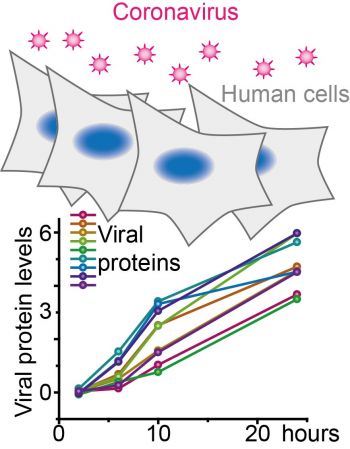12 Mar 2020 - Münch group describes coronavirus infection & potential therapies. SARS-CoV-2 infection profile and therapeutic strategies.
Since the beginning of 2020, a new coronavirus (SARS-CoV-2) has been spreading, leading to a pandemic with > 126,000 infections around the globe recorded until today. In people, the virus causes a disease named COVID-19, which can cause severe respiratory failure and has already led to more than 4,600 deaths. The mechanisms by which SARS-CoV-2 enters cells, how the cell responds to infection, and which therapeutic approaches could stop viral replication remain unclear. Now, IBC2 group leader Christian Münch, together with Jindrich Cinatl (Institute of Medical Virology, University Hospital Frankfurt), provides some answers to these questions. Using SARS-CoV-2 isolated from COVID-19 patients in Frankfurt, they established a cellular model to study coronavirus infection. Using a recently developed novel translation proteomics method, they analysed how viral infection changes cellular protein synthesis and abundance. This revealed several cellular pathways strongly modulated upon SARS-CoV-2 infection. Strikingly, using drugs targeting these pathways – some of which are approved for use in other diseases – prevented SARS-CoV-2 replication in cells. This reveals potential new therapeutic strategies for specific COVID-19 treatments.
Image frontpage: credits to Bojkova et al. and Arek Socha/Pixaby
